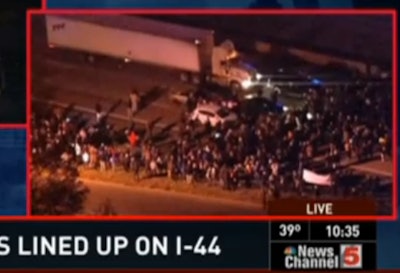 At least 10 states introduced legislation that would have strengthened regulations against protests that block highways. Tennessee and South Dakota have enacted such laws, while four states still have legislation pending.
At least 10 states introduced legislation that would have strengthened regulations against protests that block highways. Tennessee and South Dakota have enacted such laws, while four states still have legislation pending.Following a rise in public protests in recent years, especially around the election and inauguration of President Donald Trump, several states have passed or attempted to pass legislation to curb protests that spill onto highways and impede traffic.
Tennessee and South Dakota have both passed laws pertaining to blocking highways with protests, while Iowa, North Carolina, Washington and Massachusetts each have legislation pending. Mississippi and Florida had legislation die before it reached the governors’ desks. Legislation in Minnesota and Arkansas has been vetoed by the respective governors.
Tennessee’s law increases fines to anyone who intentionally blocks a highway, street, railway and more. The new fine for this Class C misdemeanor is $50. The new law also states that if the person is obstructing an emergency vehicle from accessing the roadway, the fine is $200.
In South Dakota, the new law signed by Gov. Dennis Daugaard in March bans blocking highways and interfering with traffic. The law also allows the state’s Department of Transportation to set up temporary no-parking zones.
Sitting at the subcommittee level in the Iowa senate since February is a bill that would ban people from intentionally blocking traffic on highways with speed limits of 55 mph or higher. Violators would be subject to up to five years in prison and a fine up to $7,500.

A proposed North Carolina’s bill states that a driver “exercising due care” who injures a protester blocking traffic is immune from civil penalty for the injury. The bill clarifies that a driver who hits a protester on purpose will be subject to civil liability. The bill is in a senate committee.
In Washington state, a bill would levy additional jail time to someone who was convicted of “economic disruption” while committing a criminal offense. For a misdemeanor offense, 60 days would be added to the sentence; for a gross misdemeanor, six months; and a felony offense, 12 months. The bill defines “economic disruption” to include the blocking of trucks and more.
A Massachusetts bill states that anyone who blocks traffic on a road with a speed limit of 30 mph or higher is subject to up to 10 years in prison, up to a $1,000 fine, as well as imprisonment for up to two-and-a-half years. The bill sits with the House Judiciary Committee.
Earlier this month, Minnesota Gov. Mark Dayton vetoed a public safety bill that would have, in part, increased fines for those who block highways and roadways with protests. State law currently allows up to 90 days in jail and a $1,000 fine. The new bill would have increased the jail time to up to one year and increased the fine to $3,000.
In Arkansas, Gov. Asa Hutchinson vetoed a bill that would have made “mass picketing” a Class A misdemeanor.
Bills in Mississippi and Florida died in the legislative process. Mississippi’s bill would have made the penalty for intentionally blocking a highway up to 5 years in prison and a $10,000 fine. Florida’s proposed bill would have made the intentional obstruction of a public road during a protest a second-degree misdemeanor.










